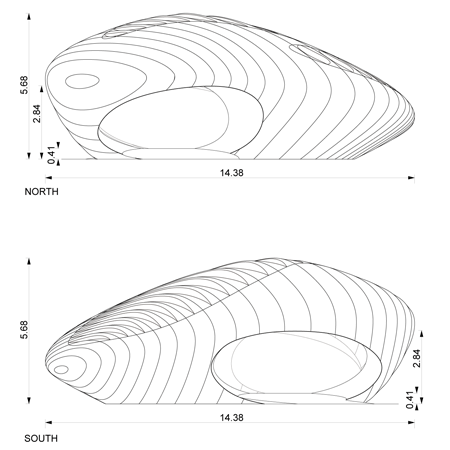
BURNHAM PAVILION [CHICAGO, USA]
2009
PROGRAM: Temporary pavilion to house multimedia installation
CLIENT: Burnham Plan Centennial
ARCHITECT: Zaha Hadid Architects
Design Zaha Hadid and Patrik Schumacher
Project Architect Jens Borstelmann, Thomas Vietzke
Project Team Teoman Ayas, Evan Erlebacher
CLIENT: Burnham Plan Centennial
ARCHITECT: Zaha Hadid Architects
Design Zaha Hadid and Patrik Schumacher
Project Architect Jens Borstelmann, Thomas Vietzke
Project Team Teoman Ayas, Evan Erlebacher
LOCAL ARCHITECT: Thomas Roszak
STRUCTURAL ENGINEERS: Rockey Structures
FABRICATOR: Fabric Images
LIGHTING & ELECTRICAL: Tracey Dear
MULTIMEDIA CONTENT: The Gray Circle
STRUCTURAL ENGINEERS: Rockey Structures
FABRICATOR: Fabric Images
LIGHTING & ELECTRICAL: Tracey Dear
MULTIMEDIA CONTENT: The Gray Circle

The pavilion is composed of an intricate bent-aluminum structure, with
each element shaped and welded in order to create its unique curvilinear
form.

Outer and inner fabric skins are wrapped tightly around the metal frame
to create the fluid shape. The skins also serve as the screen for video
installations to take place within the pavilion.


Zaha Hadid Architects’ pavilion also works within the larger framework
of the Centennial celebrations’ commitment to deliberate the future of
cities.

The presence of the new structure triggers the visitor’s intellectual
curiosity whilst an intensifi cation of public life around and within the
pavilion supports the idea of public discourse.

The pavilion was designed and built to maximize the recycling and re-use
of the materials after its role in Millennium Park. It can be
re-installed for future use at another site.

Zaha Hadid Architects’ pavilion design for Chicago’s Burnham Plan
Centennial celebrates the city’s ongoing tradition of bold plans and big
dreams.

The project encourages reinvention and improvement on an urban scale and
welcomes the future with innovative ideas and technologies whilst
referencing the original organizational systems of Burnham’s plan.

Our design continues Chicago’s renowned tradition of cutting edge
architecture and engineering, at the scale of a temporary pavilion.
The design merges new formal concepts with the memory of bold historic urban planning.
Superimpositions of spatial structures with hidden traces of Burnham’s
organizational systems and architectural representations create
unexpected results.
By using methods of overlaying, complexity is build up and inscribed in the structure.

0 comments:
Post a Comment